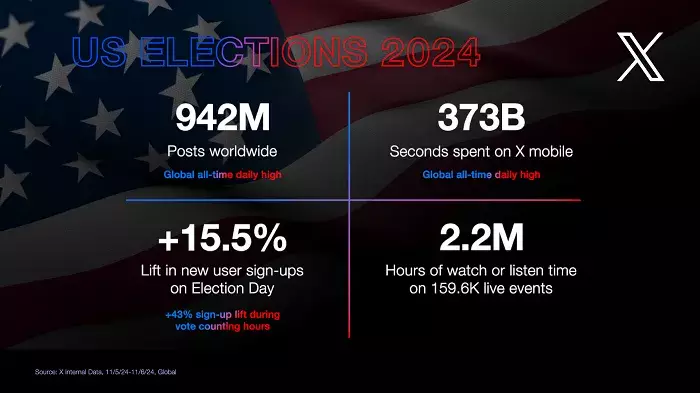The recent U.S. presidential election concluded with former President Donald Trump reclaiming his position in a campaign marked by extreme public sentiment. This event carries substantial implications not only for politics but also for the landscape of social media, particularly for platforms like X, previously known as Twitter. Elon Musk’s stewardship has intertwined the platform’s fortunes with the political arena, and a closer examination reveals the multifaceted effects of this electoral outcome.
Trump’s victory signals a significant turning point for X, a platform whose trajectory has been controversial under Musk’s leadership. The campaign’s emotionally charged environment has catalyzed an influx of users returning to X, seeking real-time updates amidst a landscape where alternative platforms, like Threads, have struggled to fulfill users’ needs for topical content. Instead of addressing the political discourse head-on, Threads has limited its capacity to engage readers interested in live news, leaving many disillusioned and searching for a more immediate source of information. As a result, X has seen a notable spike in user engagement, achieving record-high activity levels on election day and renewed interest from users across the board.
While X claims to have recorded more posts than ever and an increase in mobile engagement, it’s essential to critically evaluate these figures against the background of declining advertising revenues and previous user dissatisfaction. Just because usage metrics have risen does not inherently imply that the platform is out of the woods financially or reputationally. The user metrics painted a rosy picture, but the challenges Musk faces in maintaining sustainable and diverse revenue streams require ongoing scrutiny.
With Trump back in power, there’s optimism that X may attract returning advertisers, particularly those aligned with Trump’s ideology. Yet, it’s worth questioning whether this partnership can be cultivated convincingly. The perception of X as a divisive platform has deterred many brands wary of associating with controversial content. The newfound “support” from a politically charged user base may not be enough to allay these fears, particularly given that Musk has made it known that he intends for X to be a platform promoting specific right-wing narratives.
However, if advertisers see a viable audience that resonates with their brand messaging, there might be a shift back to X. This potential renaissance is contingent upon convincing not just advertisers but also the broader public that the platform can serve as a valuable resource for nuanced discussion rather than mere echo chambers for fringe opinions. This transformation requires proactive steps from Musk’s team to implement changes that foster a more balanced dialogue rather than exploiting polarized sentiment.
One must also examine the extent to which Musk can leverage Trump’s success as a unique selling point for X. This idea of “political influence” isn’t just a catchy tagline for marketing; it represents a real opportunity for Musk to position X as a crucial player in subsequent elections, both domestically and globally. If he can frame X as an essential vehicle for political discourse and engagement, it may entice other parties seeking to emulate Trump’s success. However, this ambition runs the risk of further entrenching X’s reputation as a platform solely for political posturing, which may alienate a segment of the user base seeking non-political engagement.
Even with these new avenues potentially opening up, it’s clear that X has much work to do. Current revenue streams remain fragile, with substantial periods of financial decline shadowing the platform’s operations since Musk acquired it. Stakeholders and users alike are cognizant of the platform’s tumultuous history, which raises skepticism regarding its potential for a swift recovery. Sustainability will be determined not just by user engagement statistics but by a comprehensive strategy addressing platform reliability, transparency, and diversity of thought.
In an era where misinformation and divisive content plague social media, the challenge for X will be to turn its newfound popularity into lasting success. While the election results could act as a catalyst for a business revival, the real test lies in cultivating an environment where genuine conversations can thrive—something that requires astute management and a willingness to listen to stakeholders across the political spectrum.
In summation, the intertwining of Trump’s electoral win with X reveals a complex narrative of hope entwined with critique. If Musk and his team can navigate these turbulent waters, they may yet find stability—and perhaps even success—amid the political machinations that continue to shape public discourse online.


Leave a Reply